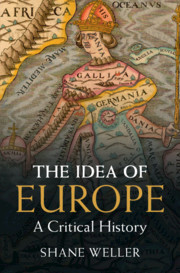Book contents
- The Idea of Europe
- The Idea of Europe
- Copyright page
- Contents
- Acknowledgments
- Introduction
- Chapter 1 Myths of Europa: From Classical Antiquity to the Enlightenment
- Chapter 2 A Great Republic of Cultivated Minds: 1712–1815
- Chapter 3 Nationalism and Universalism: 1815–1848
- Chapter 4 The Russia Question
- Chapter 5 Homo Europaeus: 1848–1918
- Chapter 6 The European Spirit: 1918–1933
- Chapter 7 A New European Order: 1933–1945
- Chapter 8 Unity in Diversity: 1945–1989
- Chapter 9 Other Europes
- Chapter 10 Europe against Itself: 1989 to the Present Day
- Conclusion Good Europeans?
- Notes
- Bibliography
- Index
Chapter 9 - Other Europes
Published online by Cambridge University Press: 14 May 2021
- The Idea of Europe
- The Idea of Europe
- Copyright page
- Contents
- Acknowledgments
- Introduction
- Chapter 1 Myths of Europa: From Classical Antiquity to the Enlightenment
- Chapter 2 A Great Republic of Cultivated Minds: 1712–1815
- Chapter 3 Nationalism and Universalism: 1815–1848
- Chapter 4 The Russia Question
- Chapter 5 Homo Europaeus: 1848–1918
- Chapter 6 The European Spirit: 1918–1933
- Chapter 7 A New European Order: 1933–1945
- Chapter 8 Unity in Diversity: 1945–1989
- Chapter 9 Other Europes
- Chapter 10 Europe against Itself: 1989 to the Present Day
- Conclusion Good Europeans?
- Notes
- Bibliography
- Index
Summary
Much of the history of the idea of Europe has played out in Western Europe, with the important exception of Russia in the nineteenth century. However, in the twentieth century, there were a number of influential reflections on the idea of Europe in both Central and Eastern Europe, notably by writers and thinkers including Czesław Miłosz, Milan Kundera, and Julia Kristeva. Chapter 9 focuses on these reflections from Central and Eastern Europe, as well as the complex view of Europe from Turkey, particularly through the work of the pro-European Turkish writer Ahmet Hamdi Tanpınar and the Nobel Prize-winning novelist Orhan Pamuk, as well as those from former European colonies in North Africa and South America, with key figures in this regard including the violently anti-European Frantz Fanon as well as the philosopher Jacques Derrida and the writer Jorge Luis Borges. This chapter considers some of the ways in which the traditional center/periphery conception of Europe might be rethought, while also revealing the extent to which Eurocentric and Euro-supremacist assumptions are far from being limited to the Western European discourse on the idea of Europe. It also reflects on the abiding idea of Europe as essential a Christian culture.
Keywords
- Type
- Chapter
- Information
- The Idea of EuropeA Critical History, pp. 220 - 246Publisher: Cambridge University PressPrint publication year: 2021

